| Manufacturer: | Rocket Pad |
 (10/10/04) This is my second Rocket Pads kit. My
first,
USSC
Shark, received mixed reviews, but I had interest in trying out another
one. So, I purchased the Shooting Star off of eBay (hate this).
(10/10/04) This is my second Rocket Pads kit. My
first,
USSC
Shark, received mixed reviews, but I had interest in trying out another
one. So, I purchased the Shooting Star off of eBay (hate this).
Rocket Pad is currently undergoing ownership change, however, regardless of that, Stan has been the primary interface through eBay, TRF and EMRR (see Opinions on some of the Rocket Pad Kits). This kit was packaged back in July 2004, so there may be some improvements since then, based on Stan's input that he has worked on all the instructions.
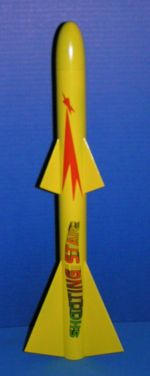 The rocket includes an 18" long, 1.6"
diameter, white paper body tube for the main body and a 2.5" plastic nose
cone (Big Bertha type) to make up the 20.5" length. The kits includes both
sets of fins pre-cut from balsa. There are two (2) laser-cut 3/32" plywood
centering rings, and two (2) 18mm motor tubes with thrust rings. The recovery
system made up of a Kevlar®
shock tether, elastic shock cord and an 12"
ASP
mylar parachute. To finish things up there is a 3/16" Launch Lug, some
clay for nose weight, and some water slide decals.
The rocket includes an 18" long, 1.6"
diameter, white paper body tube for the main body and a 2.5" plastic nose
cone (Big Bertha type) to make up the 20.5" length. The kits includes both
sets of fins pre-cut from balsa. There are two (2) laser-cut 3/32" plywood
centering rings, and two (2) 18mm motor tubes with thrust rings. The recovery
system made up of a Kevlar®
shock tether, elastic shock cord and an 12"
ASP
mylar parachute. To finish things up there is a 3/16" Launch Lug, some
clay for nose weight, and some water slide decals.
There were two kit discrepancies: 1) instead of three (3) of each fin set, there were four (4); and although the instructions referenced the use of a "black (brown tube) motor casing" there was none.
CONSTRUCTION:
The instructions are printed on 11 pages of 8½ x 11" paper. They include a single page with just the parts list, a specs sheet and then 3 pages of written instructions. There are no pictures or illustrations in the instructions, however, attached to the back of them are 5 pages of Color and B&W photos of the motor mount, fin sanding and launch lug attachment. There is also a 6th page with an illustration showing how to put the clay into the nose cone. In addition, there is a generic tube marking guide (for 1.637" and 2.6" tubes for 3 and 4 fins).
Rocket Pad calls this a Skill Level 3 kit. Perhaps... or less.
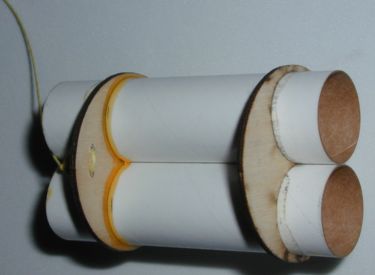 The cluster motor mount is assemble first which starts
with the thrust rings being glued in place. Then the two (2) 18mm motor tubes
are glued into the plywood, laser-cut centering rings. My rings required very
little sanding for a perfect fit. Really, all I had to do was sand off the
black burn from the laser cut. Appropriate glue fillets are applied and it is
set aside to dry.
The cluster motor mount is assemble first which starts
with the thrust rings being glued in place. Then the two (2) 18mm motor tubes
are glued into the plywood, laser-cut centering rings. My rings required very
little sanding for a perfect fit. Really, all I had to do was sand off the
black burn from the laser cut. Appropriate glue fillets are applied and it is
set aside to dry.
You are then instructed to thread the Kevlar® shock tether through the upper centering ring. It is only tied around the centering ring, where some manufacturers have you tie it around the body tubes.
Next, the body tube is marked using the fin marking guide. The guide provided is for multiple tube sizes and for 3 or 4 fins. The 3 fin lines were marked with a dot to indicate use of them. After these lines are extended the length of the tube using the "door jam" method, a mark is placed "...7 inches down from the top fo the tube, this is where each small fin will be placed". The tube is now ready.
Here is an interesting twist: the kit comes with a clothes-pin. This is used to clip to the Kevlar® shock tether. Then after testing fit and applying glue to the inside of the body tube, the clothes-pin is fished through the tube bottom and the motor mount is slide/glued into place. I didn't do this, as I prefer to thread it back through the motor tube and have it out of the way. But, this method would work too.
The fins are sanded, rounded, and glued in place. Interestingly, the supplied picture of the fins being sanded was showing four (4) fins. The kit came with four (4) fins, but based on everything else (picture, tube marking guide, and website pictures) it was supposed to be a three (3) fin rocket. Regardless, they were made from high quality (dense) balsa wood.
Attaching the fins instructions read, "The big fins mount even with the bottom of the body tube and the small fins mount at the mark you made on the fin lines." Okay, easy as pie on the big fins, but the small fins made me think: do I align the top or the bottom of the small fin to the 7" mark I made on the body tube? Buy using the pictures for scale, I determined that it is the bottom of the fin that is aligned to that mark. Perhaps it is obvious for other builders.
Next, the parachute is assembled, the elastic is attached to the Kevlar® shock tether and the nose cone.
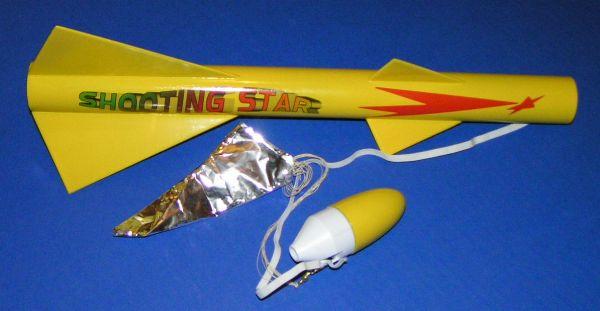
The nose cone gets a load of supplied clay pushed into it for nose weight. Once complete the rocket is ready to finish.
I used my typical techniques for preparing the body tube and nose cone for painting. I have to comment on the quality of the balsa fins. They were so "tight" they reminded me of working with basswood and only took a couple coats of Plasti-Kote primer as well. After it was ready, I painted it with my last bit of Krylon Yellow that I had to buy to fix the Tour De Deuce rocket. (You should use white primer under lighter colors like Yellow, but I didn't this time...doh!). I am personally not a huge fan of Krylon paint, and got a little run with it. This was hidden though so no problem. It should also be noted that Rocket Pad suggests painting the rocket bright yellow.
There are two large water-slide decals provided with the Shooting Star. Very colorful and thematic. I found these to require a longer soak period (closer to 60 seconds) to be able to slide. This is now my second experience with Rocket Pad decals and I have to say that they are actually a pleasure to work with!
Overall, for CONSTRUCTION I would rate this kit 3 ½ points. Build sequence and quality/fit of parts was good. Instructions are adequate but could use some improvement. There were a couple of kit discrepancies but I image these have been addressed in future kits (and after all, I rather have 4 fins provided for a 3 fin kit, than 2!). Decals are excellent! It would be nice to have motor retention.
FLIGHT/RECOVERY:
Rocket Pad recommends (2) A8-3, B6-4, C6-3 and C6-5 motors.
My finished rocket weighed in at 3.7 ounces with a CG at 10.25" from the nose cone (see my RockSIM file).
I decided to fly it for the first time on a two (2) A8-3's as recommended by Rocket Pad for first flight. I loaded the motors, using tape/friction fit. I then stuffed 6 sheets of Estes wadding, and put in the parachute. I installed two ignitors and plugs, being careful to let them overlap so that I could twist the leads together. It was now ready to fly.
RockSIM indicates that I should get about 140 feet on the A8-3's. I was taking a lift-off picture, so I'm not sure how high it went, but it was a very quick flight. There was no damage and the descent rate on the 12" mylar 'chute was how I like it (a bit fast).
The second flight was using two (2) B6-4's. I got to watch this one and saw the rocket fly stable, but not as-straight-as-an-arrow. It kind of made a large spiral upward. Ejection was just a bit before apogee. Deployment was good and we almost caught this rocket on the way down.
Third flight was on two (2) C6-5's. This time, my picture taking activity was to try to catch it from the bottom going up. In this animated picture sequence you can see how it flies stable, but with that large spiral upward.

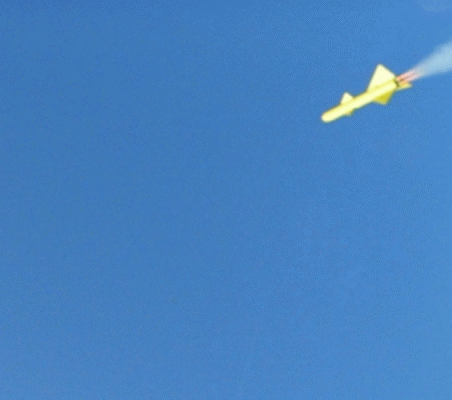
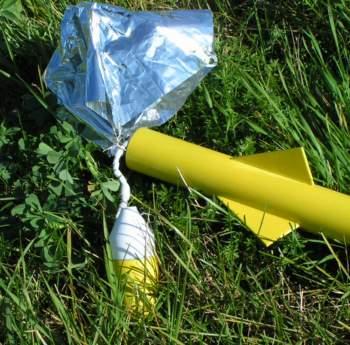 The C6-5 flight was great until deployment. A couple
of shroud lines tore off of the mylar 'chute and then as the rocket fell, it
twisted itself into a bit knot. No damage to the rocket though. Interestingly,
my experience with the
USSC
Shark was about the same: losing a shroud line on the 3rd flight. I will
replace the parachute with a nylon one.
The C6-5 flight was great until deployment. A couple
of shroud lines tore off of the mylar 'chute and then as the rocket fell, it
twisted itself into a bit knot. No damage to the rocket though. Interestingly,
my experience with the
USSC
Shark was about the same: losing a shroud line on the 3rd flight. I will
replace the parachute with a nylon one.
So why the large spiral. My guess is that the upper and the lower fins are not aligned just perfectly. They are very good, mind you, but I didn't use a jig of any sort. I'd love to hear if others see the same large spiral upward.
The Kevlar® to elastic shock cord system is excellent and there were no dents associated with nose cone kick-back.
For FLIGHT/RECOVERY, I would rate this rocket 4 ½ points. Nice flights on A8 through C6 clusters. The parachute is sized correctly, however, I believe the shroudline attachment is too weak. Perhaps it needs taped corners, or better yet, provide a nylon 'chute. Not sure about the upward spiral, but I don't blame the kit design.
I give the rocket an OVERALL rating of 4 points. Being one of the few clusters out there (although more and more are showing up), this is a fun one to get. It is a straightforward build and most rocketeers with any experience should be able to put this one together. Simple design made lively with the decals! Rocket Pad has a few things to clean up in their kits, but once done, all should expect them to be a leading manufacturer. Oh, yes, they need to get rid of the eBay-Way and get their own website or dealers.
Update 06-28-08:
Adding a couple of pictures that were taken at NERRF4 (by Brian?).
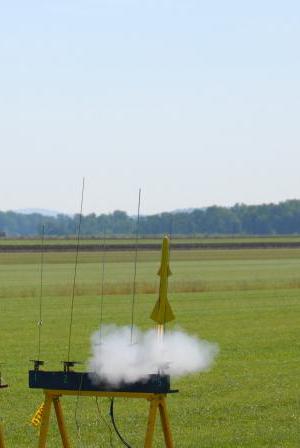
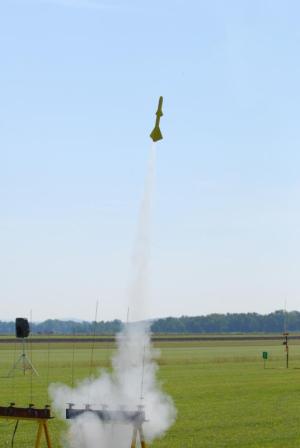
Sponsored Ads
 |
 |











